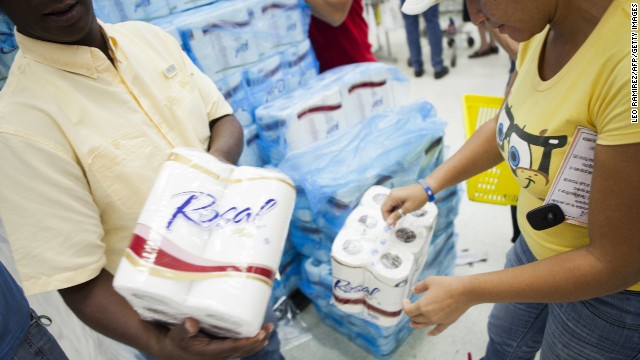File photo of consumers buying rationed goods
during the inauguration of the state-owned
Bicentenario supermarket in Caracas in June.
STORY HIGHLIGHTS
- Venezuela occupies Paper Manufacturing Company's plant in Aragua, vice president says
- VP: Nation won't "allow hoarding or failures in the production and distribution" of essentials
- Government accuses companies of hoarding, blames media for fanning fears
- Private firms says ill-conceived price control, currency policies have stifled production
If you're the Venezuelan government, you take over a toilet paper factory.
On Saturday, Vice President Jorge Arreaza announced the "temporary occupation" of the Paper Manufacturing Company's plant in the state of Aragua. The aim, he explained, is to review the "production, marketing and distribution (of) toilet paper."
"The ... People's Defense from the Economy will not allow hoarding or failures in the production and distribution of essential commodities," the vice president said.
By the "People's Defense," Arreaza was referring to a government agency created on September 13 by President Nicolas Maduro to "defeat the economic war that has been declared in the country," according to a report from state-run ATV. This group is charged with looking at inefficiencies across various industries in the nation, including foods and other products, and taking action presumably in the South American nation's best interests.
Toilet paper is very much a part of the war.
The bathroom essential is one of the basic goods and foodstuffs that have been disappearing from store shelves since earlier this year. In Caracas, for instance, long lines are common whenever new rolls come in.
As the amount of TP and other products, such as rice and cooking oil, have lagged, the blame game has picked up.
Businesses and the political opposition say the shortages stem from ill-conceived government policies such as price controls on basic goods and tight restrictions on foreign currency. These moves make it so many producers can't even break even, they say.
But the government has said private companies aren't doing their part, accusing them of hoarding their products in hopes of selling it later at a higher price.
They've also suggested the problem is tied to a broader conspiracy.
"There is no deficiency in production," Commerce Minister Alejandro Fleming said in May according to ATV, "but an excessive demand generating purchases by a nervous population because of a media campaign."
At that time, Fleming announced the country would import 50 million rolls of toilet paper to meet demand. Other hygiene products, such as toothpaste and soap, may be

No comments:
Post a Comment